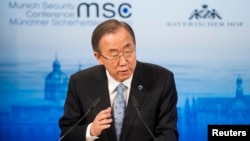MUNICH, GERMANY —
U.N. Secretary-General Ban Ki-moon says Syria's government and its political opponents should bring greater seriousness and urgency to international efforts to end their conflict. Their first round of talks ended Friday with little progress on how to end the fighting or increase humanitarian access.
Ban Ki-moon says the first round of Syrian talks shows that progress will be difficult and the process itself is hard-going, but at least it is a start.
"The parties may still be fighting. But now they are also talking. This is the only hope for a political solution," he said.
When talks resume February 10, Ban says President Bashar al-Assad's government and its opponents must both bring a new attitude.
"They should come with more sense of honestness as well as seriousness and urgency," he said. "The negotiations must not be used as a tactic to delay the end of fighting. There is no military solution to this crisis."
Ban and the joint special representative Lakhdar Brahimi met late Friday with U.S. Secretary of State John Kerry and Russian Foreign Minister Sergei Lavrov to discuss the talks. They are all in Munich for an international security conference.
Ban says he urged both the United States and Russia to use their influence to ensure that the peace process continues. Russia is an ally of the government in Damascus. The United States backs Assad opponents.
Kerry says he is working with Lavrov to keep the Assad government engaged in the peace process.
"There are powerful feelings for why we believe Assad needs to feel even more sense of urgency to come to the table," he said.
Lavrov says there is much pressure on Moscow to influence Damascus. But, speaking through a interpreter, he said Russia can not accomplish anything on its own if those supporting the opposition do not do the same.
"We are putting daily pressure on the Syrian government. It is in a very difficult situation. And to try to convince a government which is waging a war to make some gestures is a very difficult task. You know what I'm talking about," he said.
Lavrov says the political opposition at these talks is too narrowly drawn from groups with little popular support on the ground. Speaking through a different interpreter, he said the key to success is to make the talks truly representative.
"All those influencing the opposition should do their best for the delegations at the negotiating table to represent the whole spectrum of Syrian society," he said.
Brahimi says there was some progress in getting humanitarian aid to the Yarmouk refugee camp in Damascus, home to thousands of Palestinians who have been residents in Syria since before the civl war there began. However, Brahimi said there was no movement to report on efforts to get aid shipments into the city of Homs, or on a prisoner exchange between the Syrian government and rebels. "The gaps between the sides remain wide," he says, "there is no use pretending otherwise."
Ban Ki-moon says the first round of Syrian talks shows that progress will be difficult and the process itself is hard-going, but at least it is a start.
"The parties may still be fighting. But now they are also talking. This is the only hope for a political solution," he said.
When talks resume February 10, Ban says President Bashar al-Assad's government and its opponents must both bring a new attitude.
"They should come with more sense of honestness as well as seriousness and urgency," he said. "The negotiations must not be used as a tactic to delay the end of fighting. There is no military solution to this crisis."
Ban and the joint special representative Lakhdar Brahimi met late Friday with U.S. Secretary of State John Kerry and Russian Foreign Minister Sergei Lavrov to discuss the talks. They are all in Munich for an international security conference.
Ban says he urged both the United States and Russia to use their influence to ensure that the peace process continues. Russia is an ally of the government in Damascus. The United States backs Assad opponents.
Kerry says he is working with Lavrov to keep the Assad government engaged in the peace process.
"There are powerful feelings for why we believe Assad needs to feel even more sense of urgency to come to the table," he said.
Lavrov says there is much pressure on Moscow to influence Damascus. But, speaking through a interpreter, he said Russia can not accomplish anything on its own if those supporting the opposition do not do the same.
"We are putting daily pressure on the Syrian government. It is in a very difficult situation. And to try to convince a government which is waging a war to make some gestures is a very difficult task. You know what I'm talking about," he said.
Lavrov says the political opposition at these talks is too narrowly drawn from groups with little popular support on the ground. Speaking through a different interpreter, he said the key to success is to make the talks truly representative.
"All those influencing the opposition should do their best for the delegations at the negotiating table to represent the whole spectrum of Syrian society," he said.
Brahimi says there was some progress in getting humanitarian aid to the Yarmouk refugee camp in Damascus, home to thousands of Palestinians who have been residents in Syria since before the civl war there began. However, Brahimi said there was no movement to report on efforts to get aid shipments into the city of Homs, or on a prisoner exchange between the Syrian government and rebels. "The gaps between the sides remain wide," he says, "there is no use pretending otherwise."




